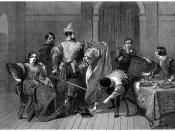Essay on Shakespeare's Views on Sentimentality William Shakespeare was a seventeenth-century playwright who composed many now-famous plays, such as his tragedies of Hamlet, Romeo and Juliet, Othello, King Lear, and others, and his comedies, such as The Taming of the Shrew, Much Ado About Nothing, and A Midsummer Night's Dream. Shakespeare's plays have many important messages, but one conflict that continually turns up in nearly all of his plays is that of sentimentality versus logic. Hamlet's use of his emotions instead of careful thought brought him and his family to disaster. Romeo and Juliet's blinded love drove them to death. And this question is even addressed in comedies, such as The Taming of the Shrew, in which Kate's violence doesn't do anything for her when she is wed, so she must think before she acts. This topic will be discussed and concluded upon in this essay.
Shakespeare's Hamlet is a tale of murder, madness, and ghosts, where young Hamlet hears of his father's murder and swears to take revenge on his murderer, his uncle.
While trying to carry this out, he ends up destroying his family and himself with his overzealous rage and emotions. Indeed, the action that eventually gets him killed is that of accidentally murdering Polonius, who Hamlet thought was his evil uncle. Polonius' son then ends up challenging Hamlet to a duel and killing him (Hamlet). This failure to check to be sure that it was his uncle Hamlet was about to kill showed that he often put his emotions and anger before logic, which makes him a tragic Shakespearian hero.
In Romeo and Juliet, Shakespeare emphasizes his point that foolish love can be dangerous. Romeo and Juliet, knowing each other for less than a year, kill themselves for their wanton passion. When Romeo found out that Juliet was dead, he went straight to the apothecary to get a poison (Romeo and Juliet). This fact shows that Romeo and Juliet acted without thinking, on their sentiments.
In Shakespeare's comedies especially, sentimentality overcomes reason, though people don't usually get killed from this mistake. In The Taming of the Shrew, Kate is an angry, rebellious person who shows her feelings openly and doesn't regret saying the insults to people that she often does. When she is married to a mocking husband who "tames"� her by taking anything that isn't "good enough"� for her, namely, everything, she has to learn to suppress her pride, obey her superiors, and not express her anger (which she often had) on other people (Taming of the Shrew). In this play, she does change her ways, unlike Hamlet, Romeo, and Juliet. She still, however, had to face the conflict of sentimentality versus logic, which nearly all Shakespearian characters did.
All of these examples show that Shakespeare did care about this issue, and put it before his audiences in his plays. Shakespeare wanted to tell people that it was wrong to be overly sentimental at the expense of reason. These aforementioned works of literature pointed out that, in extreme cases, too hasty an expression of emotion can lead to death or suffering. And thus, Shakespeare warned his audience during that Age of Reason that logic will triumph over feelings, no matter what.





